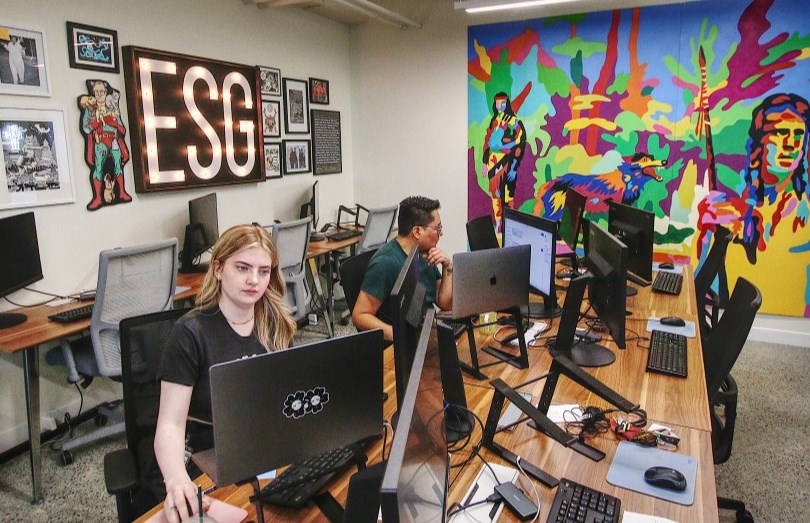Throughout the pandemic, certain businesses flourished, including streaming and video game companies.
A reckoning was to be expected, however, once the pandemic was over and life returned to normal, and that reckoning certainly happened for streaming companies such as Disney+ and Netflix (Nasdaq:NFLX), which posted some big losses in 2022.
But with the exception of more than 100 job losses earlier this year at 91‘≠¥¥’s Relic Entertainment, the region’s gaming industry in general has been holding its own.
“For the most part, things are pretty good,” said Jayson Hilchie, president of the Entertainment Software Association of Canada (ESAC). “Obviously, there are some layoffs here and there, but far fewer than I expected, given the economic environment.”
In May this year, just three months after Relic Entertainment released the PC game Company of Heroes 3, the studio announced it was laying off 121 people.
“The combination of significant project delays, rapidly rising costs, high inflation and foreign exchange rate fluctuations have had a combined negative effect on our business,” Relic general manager Justin Dowdeswell and COO Heidi Eaves explained to employees in a post on LinkedIn.
“As a result, the measure of success for a studio of our size has grown, and it has put more pressure on our titles to succeed in an increasingly competitive marketplace.”
Other video game studios are faring better.
In a first-quarter earnings call last week, Electronic Arts (Nasdaq:EA), which employs more than 1,200 people at its EA 91‘≠¥¥ campus in Burnaby, announced it made record quarterly profits in the three-month period between April and June, with net revenue of US$1.9 billion and net income of US$402 million.
The video game sector in Canada grew by 35 per cent between 2019 and 2021 to 937 companies, according to a survey by ESAC. The industry contributed $5.5 billion to Canada’s GDP, the association estimated, and directly employed 32,300 91‘≠¥¥s. In B.C., gaming employment grew by 19 per cent to 8,700 jobs.
The association has not updated its survey for 2023, but Hilchie said indicators are that the sector is holding up well.
“We do think there’s been some growth [since 2021],” he said. “So far everything seems to be quite stable.”
“It continues to thrive, and I’ve seen excellent growth in the sector,” said Brenda Bailey, B.C.’s current minister of jobs, economic development and innovation, former executive director of DigiBC and a co-founder of the game studio Silicon Sisters.
“There’s less individual IP being built in British Columbia than there is work for hire,” she said. “I’d love to see that change over time. I think the real value is in the IP.”
“We really did well during the pandemic, obviously, because people had a limited number of things to do,” Hilchie said. “We did phenomenally well, and we knew there was going to be a drop-off at the end of it. But we’re still better off than we were prior to the pandemic started.
“We’re not doing as well as we did in 2021, but we’re doing better than before that.”
A number of studios in 91‘≠¥¥ make games or underlying technology and software for either Microsoft Corp. (Nasdaq:MSFT) or Activision Blizzard Inc. (Nasdaq:ATVI), which are poised to merge into one massive entity in an acquisition worth nearly $100 billion. Microsoft plans to acquire Activision Blizzard for US$68.7 billion ($91 billion 91‘≠¥¥).
Whether that will be good or bad for 91‘≠¥¥ studios that make products for either Microsoft or Activision remains to be seen.
91‘≠¥¥’s The Coalition makes the blockbuster console game Gears of War, which is exclusive to Microsoft’s Xbox and Windows platforms.
Demonware, a subsidiary of Activision, is headquartered in Ireland but has a studio in 91‘≠¥¥. It doesn’t make games but provides underlying technology like matchmaking used in multiplayer online games like Call of Duty. Treyarch Corp. has a 91‘≠¥¥ studio that works on Activision’s Call of Duty.
“Obviously, we would hope that the merger would result in more opportunity for the two companies together,” Hilchie said.
Josh Nilson, co-founder and studio head of East Side Games – maker of the popular mobile game Trailer Park Boys, Greasy Money – is hopeful the merger will ultimately be good for the 91‘≠¥¥ gaming sector.
“I think what it will do is provide more opportunities not only for publishers but also for indies to get into the space,” he said.
“I have no idea what’s going to happen. It’s a massive deal. Pretty much every gamer is going to be affected. But it’s interesting because there’s a huge mobile element to it, which I’m most interested in. There’s going to be maybe a bigger push into mobile with some of these properties, as mobile continues to grow.”
One challenge for some studios is studio space: Many no longer need that much. East Side Games is one studio that ended up downsizing to a smaller office space after the pandemic because so many employees now work from home. The company employs about 100 people, but no more than 20 at a time are in the office, Nilson said.
Like every other sector of the economy, acquiring and retaining talent is a top concern for the video, PC and mobile gaming sector.
“British Columbia is known as a hotbed for talent,” Bailey said. “That really has been one of our competitive advantages and we need to ensure we continue that.”
The BC NDP government created a permanent provincial nominee program to accelerate the inflow of software engineers and has created 2,900 new technology seats at universities and colleges in B.C. Bailey said her government plans to create another 3,000 seats.
“We’re seeing a lot more government attention to immigration and fast-tracking highly skilled people, which is great because our industry needs those types of people,” Hilchie said.



